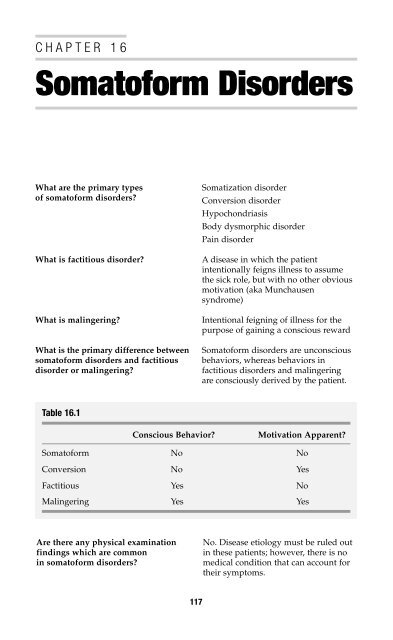Behavioral Science
Create successful ePaper yourself
Turn your PDF publications into a flip-book with our unique Google optimized e-Paper software.
Cognitive Disorders 115<br />
AMNESTIC SYNDROMES<br />
How do amnestic syndromes differ<br />
from dementia?<br />
Which brain structures are affected<br />
in amnestic syndromes?<br />
Damage to mediotemporal structures<br />
is associated with what vitamin<br />
deficiency?<br />
Name at least four other etiologies<br />
of amnestic syndromes.<br />
In amnestic syndromes, the disturbance<br />
of function is isolated to memory, while<br />
other cognitive functions remain<br />
relatively intact (unlike dementia).<br />
The bilateral mediotemporal structures<br />
(eg, mammillary bodies, hippocampus,<br />
fornix)<br />
Thiamine deficiency. Often this is<br />
related with chronic alcohol abuse<br />
(Korsakoff syndrome)<br />
1. Traumatic brain injury<br />
2. Herpes encephalitis<br />
3. Cerebrovascular disease<br />
4. Hypoxia<br />
CLINICAL VIGNETTES<br />
A 79-year-old African American woman has dementia. Her son has heard about the<br />
genetic basis for Alzheimer disease and is worried about his risk of developing the<br />
disease. Looking over her chart you see that she was high functioning 10 years prior<br />
and then first suddenly became rather mildly cognitively impaired about 7 years<br />
ago. She continued at that level until 5 years ago when she developed significant<br />
memory problems and needed some part-time help at home. Two years ago she<br />
again got worse and required assisted living. What do you tell her son about his<br />
risks of Alzheimer disease?<br />
His risk is the same as the normal population. The patient’s history with a<br />
“stepwise decline” is suggestive of vascular dementia, not AD.<br />
You are on the psychiatric consult service and called to see a psychotic patient in<br />
the ICU. The resident there tells you that the patient—a 57-year-old woman with<br />
no prior psychiatric history—is having new-onset schizophrenia. She seemed fine<br />
this morning, but this evening she has hallucinations and is yelling at the nursing<br />
staff. What is the likely diagnosis in this patient? What can be done to help, aside<br />
from medications?<br />
This patient most likely has delirium and almost absolutely does not have<br />
schizophrenia. You should be wary of diagnosing an older individual with a newonset<br />
psychotic disorder, especially when underlying medical illness is actively<br />
involved. Delirium is so common in acutely sick patients that it is called “ICU<br />
psychosis.” First and foremost, trying to alleviate the medical condition (or stopping<br />
the offending medication) which has precipitated the delirium is the first course<br />
of action. Environmental factors may help, such as cues to help orient patients to<br />
time, date, and place.



